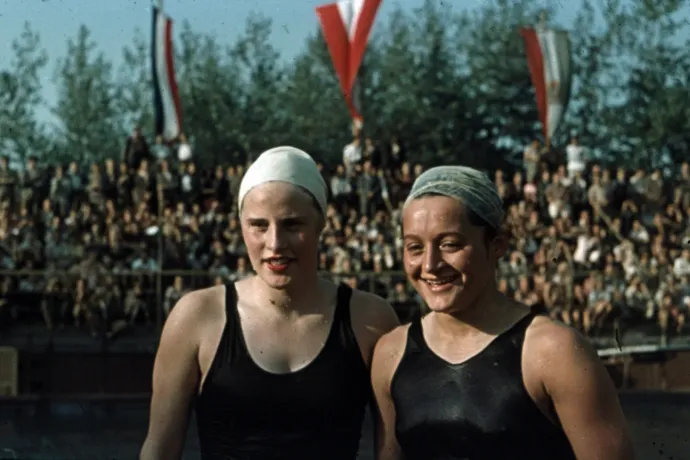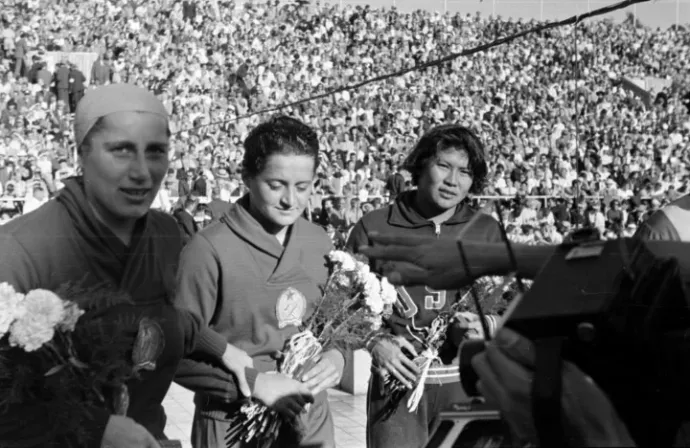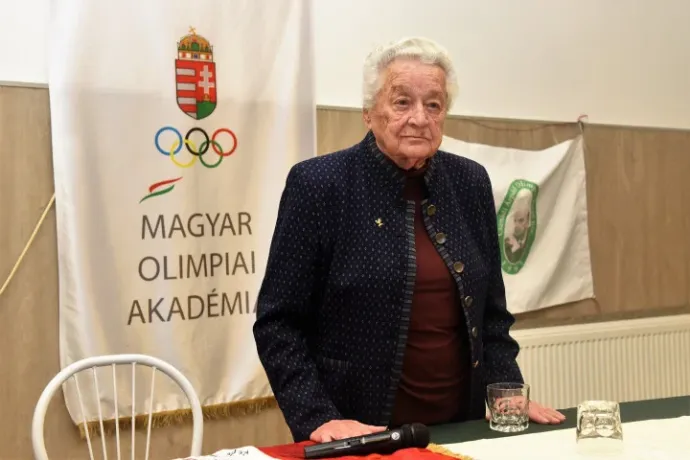
It is very rare for an athlete to become an Olympic champion without first having won an individual gold medal at a European or World Championship, or even at a Hungarian championship. Valéria Gyenge won a gold medal at the most successful Olympics for Hungary, the 1952 Helsinki Olympics without having been a national champion before. Her victory was a surprise even though she had won the 400 freestyle at a smaller event a month before the Olympics, having set a good time. The Hungarian swimmers were at their best then, and the team was by far the strongest ever, with four of the five gold medals going to Hungary.
Gyenge learned to swim in Balatonalmádi at the age of six. No one taught her, she simply learned from other children by watching what they were doing in the water. She spent her summers there on the shores of Lake Balaton, and when she was eight years old she saw a broad-shouldered, handsome boy, Csaba Pálfi, swimming in the lake with beautiful strokes. It was then that she decided she would be a swimmer too.
After taking up swimming, she caught the eye of her first coach, Magda Jávor, at a school swimming competition after the war ended in 1945. Two years after they had met, Jávor, critical of her own coaching skills realized that she could no longer help her develop her talent, so she suggested that she should go to Imre Sárosi. Sárosi was a renowned, strict and methodical coach. His team was called the "Sárosi Stable" for a good reason: only the best were allowed to go there, and he wanted to get the best out of everyone. Éva Székely, who was six years older than Gyenge to the day, also trained with Sárosi, who was only known in the sport as 'Mesti', a nickname for ‘master’.
Gyenge continued to improve, winning relay titles and four silver medals at the 1951 national championship, including one in the 200 butterfly. Even so, she was not the favourite for the 1952 Olympics, with Éva Székely and Éva Novák expected to win gold in the 400 freestyle. Gyenge was bothered by the unusually late sunset in Finland and didn't even swim well in the preliminaries (5:22). The white nights meant that she had to put a big blanket over her window in the Olympic village, but she still couldn't get a good night's rest. In the semi-finals she was much faster, her fatigue was gone, and she improved by six seconds in two days (5:16), which qualified her for the final with the best time, and was accordingly placed in the fourth lane. Novák and Székely were also in the final.
"The coach of the American team asked Sárosi who would win the race, one of the Americans, Kawamoto or Green, or Hveger from Denmark, or the 200 m winner Éva Székely? Mesti pointed to me. The American had a good chuckle, complimenting my coach's sense of humour. An hour later, the dream became a reality. I don't remember much, because I was in ecstasy. In my dreams, I still remember that I wasn't supposed to start fast, and I kept to it, I was only fourth for the first two hundred metres. Then I woke up and was revived on the next length. The only chance I had was not to rush the beginning because then I would have enough strength to finish. I touched the wall at 5:12. I was 1.6 seconds faster than Éva Novák, I glanced sideways just before the finish and saw her yellow cap, and that's when I believed I could win this race. Maybe Mesti had timed my form for the last day, but it was a mystery to me how I had improved so quickly, day by day", Gyenge recalled later.

Gyenge won the Hungarian delegation's thirteenth gold medal, but she was not bothered by this number, as she wasn't superstitious. On the medal podium, she was clutching the little box of the medal tightly, finding it difficult to believe it was really hers. She had no idea what a huge success she had achieved. She realised she had achieved something great only when she received a telegram from her parents: “My little star, my baby, I am the happiest mother in the whole world, your daddy, your brother, and I all send many kisses.”
After the results were announced, she could watch the water polo and football finals and see László Papp defend his title in boxing. It was the first day in the history of Hungarian sport when four Hungarian gold medals were won within a few hours, a feat that has not been surpassed since. With 16 gold medals, Hungary finished third on the medal table of the nations.
The team arrived by train at Keleti Railway Station, where the winners were received with a great celebration and a crowd of 100,000 people waiting for the delegation, according to contemporary reports. Gyenge received 10,000 forints for her gold medal, which was considered a huge sum at the time. She spent some of it on her father, surprising him with something he had been longing for but she can no longer remember what it was.
The athletes were expected to give talks about their experiences at public events, and in return for the indulgences provided for top athletes, they also had to take part in political events. She had to speak at a women's world peace congress and she was more nervous than she ever had been in the pool. In January 1954 she was allowed to go to Finland once more in the name of world peace, and the Finns admired her leg stroke in the pool. They also asked her how it's possible that despite having a thousand lakes, they did not have such good swimmers, while Hungary only had Lake Balaton, and yet had managed to send a fantastically strong team to the Olympics. The swimmer replied that the government provided generous support for the sport, and this was also a factor in their success. She also liked the fact that athletes were able to travel a lot. She had the chance to see the Eiffel Tower in Paris, which was unthinkable for the average Hungarian at the time.
Gyenge finished second behind Ágota Sebő at the 1954 European Championship in the 400 freestyle. However, she won a gold medal in the 4x100 freestyle relay, and her team set a world record. Sárosi, meanwhile, warned her against falling in love, disapproving of a water polo player, János Garay, the son of an Olympic champion fencer who was courting his student. Not only Sárosi, but her parents frowned on this relationship as well.
In November 1954, the sports magazine Képes Sport wrote that besides being a top athlete, she had time and energy for work, as she had became a staff member of the photo laboratory of the Hungarian Railways.
"Learn this "miracle" from them, the rest of you, the young athletes of the swimming pool, the track and field and the green grass. And you will become not only champions, "wonders of the world", but true men and women."
– that is how the journalist Pál Peterdi praised not only her but also Klára Killermann, who worked in a slaughterhouse.
She had developed a passion for photography earlier, developing the photos in the bathroom of her flat. It helped her hobby that she won two Pentax cameras at a competition in Magdeburg in 1951 – she had no idea at the time how much of a role this would play in her later life. She was preparing intensively for the 1956 Olympics, and had her eyes set on defending the title. She was in good form, and she and Garay were already planning their life together, thinking they would marry after she returned from Melbourne in December.
The wedding was indeed held, but instead of Budapest in Toronto as they did not return to Hungary because of the revolution that broke out in Budapest before the December Olympics.
"We flew from Prague to Melbourne after nerve-racking excitement. As the chartered plane only had one set of crew, the rules allowed only a short flight time, and planes then couldn't even fly the distance they do now. Every day we landed in a different place, sometimes having to wait a whole day for the next leg. It took us ten days to get to Melbourne. Under any other circumstances, it would have been a very enjoyable and interesting trip as I loved travelling. We spent days in Istanbul, Karachi in Pakistan, and in Fiji, where few Hungarians had been at that time."
At the Olympics, she could not concentrate properly because of the uncertainty at home. Just before one of her events, she received a telegram from her fiancé saying that he had made it to Vienna and will be able to go to Canada. She somehow qualified for the 400 freestyle final, but only finished eighth.

The Toronto Star got wind of Valéria Gyenge's story and the paper's management offered her a deal to pay for her plane ticket to Canada and in exchange, she was not allowed to give interviews to anyone else for a while. She accepted the exclusive offer, so she didn't travel to California with the Hungarian delegation, (dozens of Hungarian olympians accepted the invitation of Sports Illustrated magazine and went on the “Freedom Fighters' Tour” around the US, where most of them settled afterwards) but went to Toronto instead, where her fiancé was waiting for her. Her wedding was, of course, reported on the front page of the paper. While at home they used to report on her greatest achievements in short news articles only, abroad, the champion swimmer who chose to move on with her life in Canada, was portrayed in huge photos.
Gyenge sold one of her Pentax cameras and used the money to buy a winter coat because she only brought her swimming gear with her from Australia. She also got some winter clothes from a Canadian girl. At first, she was very homesick and made her living by taking photos of Hungarian immigrant families who sent the photos home to the other family members back in Hungary. Her husband became a building contractor, and within a few years he became rich and they lived comfortably. In 1960 their first daughter Judy was born, who had a chance to qualify for the Montreal Olympics in breaststroke, but missed her chance by just a few split seconds. Their second daughter, Soo, became an actress, starring in Neighbours and appearing in numerous Canadian films.
"I never wanted to be their coach. I had experienced first-hand how tough it is to train hard and I didn't want to cause them any inconvenience. For me, the penalty for a delay used to be two thousand metres of butterfly, and I didn't want to make them suffer. Now my older daughter looks after me, she's always checking on me as I swim in Lake Ontario behind our cottage. I don't like chlorine, but I do like natural water, and I venture in around May. And she is pleased to see that I haven't forgotten how to swim," she told Telex.
She never abandoned photography, and in 1983 her photo album titled My Country was published in both Hungary and Canada, with poems by Gyula Illyés. The poet's widow chose the lines to go with the photos taken in different parts of the country. She has written three books and has a fourth in mind. She doesn't want her mind to go soft, she added jokingly.
Gyenge, who turned 91 in April, returns home every year – she considers both countries her home – and is the only one of her generation still alive. Her best friend Klára Killerman died 11 years ago, and Kató Szőke, who settled in Los Angeles after the '56 Olympics, died 7 years ago.
She has been inducted into both the American and Hungarian Swimming Hall of Fame and has even been asked for an autograph from Germany. "My granddaughter used to say, ‘Grandma, you must be very rich to have such beautiful gold medals.’ I don't look at them every day, but it's nice to remember. I was invited to Budapest to an event organized by the Árpád Csanádi Friends of the Olympics Circle, and I was filled with the same warmth as when we came home from Helsinki. I, a 90-year-old old woman, was applauded. They still remember me.
At times like this, people always ask me what the secret to a long life is. I can only say that life should not be taken too seriously, you must be able to smile about it.
I'm the age of dinosaurs now, so I can say that with confidence."
If you enjoyed this story about an extraordinary Hungarian, and want to make sure you don't miss similar ones in the future, subscribe to the Telex English newsletter!